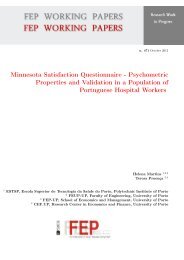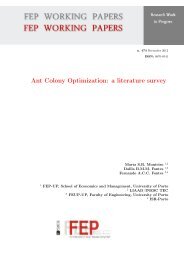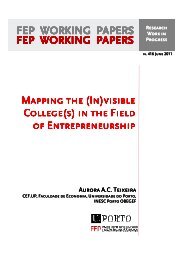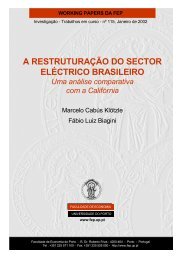FEP - Working Papers - Universidade do Porto
FEP - Working Papers - Universidade do Porto
FEP - Working Papers - Universidade do Porto
You also want an ePaper? Increase the reach of your titles
YUMPU automatically turns print PDFs into web optimized ePapers that Google loves.
Analogously, if i ∈ IR, we have that:<br />
piL =<br />
n − k + 1<br />
2n − 2k + 1 t and piR =<br />
n − k<br />
2n − 2k + 1 t.<br />
The expressions for the marginal consumers, ˜xL and ˜xR, follow immediately:<br />
˜xL =<br />
n − k + 1<br />
2n − 2k + 1<br />
and ˜xR = k<br />
2k + 1 .<br />
It is straightforward to see that ˜xL > ˜xR. Contradiction.<br />
Proof of Proposition 3.<br />
By Lemma 2, there is no equilibrium with prices in S2. Therefore, we must seek prices<br />
satisfying the condition � n<br />
i=1 |piL − piR| ≤ t.<br />
As obtained in (8), the first-order conditions of the n shops at the malls imply that:<br />
Therefore:<br />
PL = n<br />
n + 1 (t + PR) and PR = n<br />
n + 1 (t + PL) .<br />
Using (7), we obtain the individual prices:<br />
PL = PR = nt.<br />
piL = piR = t, ∀i ∈ I.<br />
To complete the proof, we must verify that these local maxima are global maxima. We<br />
need to check if each shop chooses the price t, when the remainders charge t for their<br />
products. Without loss of generality, we consider the shop that sells good iR.<br />
Substituting pjL = pjR = t, ∀j �= i and piL = t in the demand for good iR, given in (10),<br />
we obtain:<br />
qiR =<br />
⎧<br />
⎨<br />
⎩<br />
1 − piR<br />
2t , piR ∈ [0, 2t]<br />
0, piR ∈]2t, +∞[<br />
27<br />
.<br />
�











